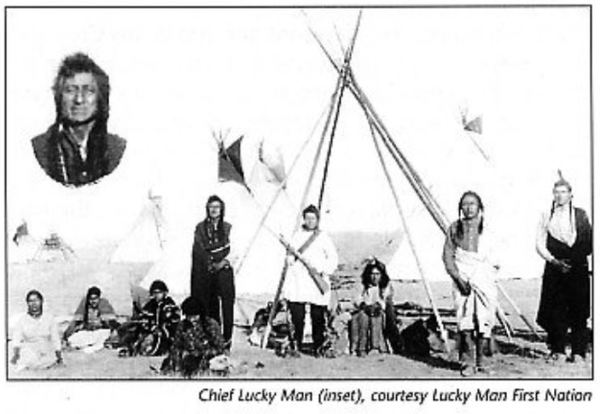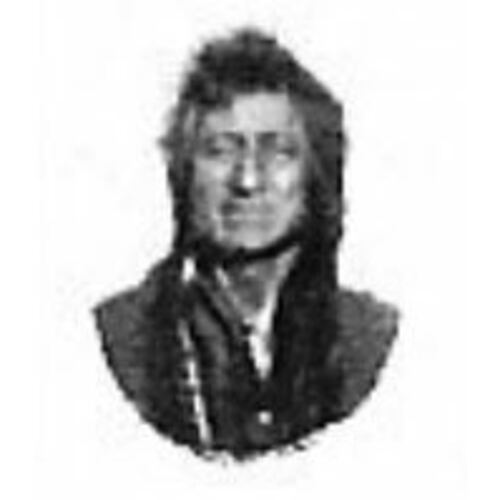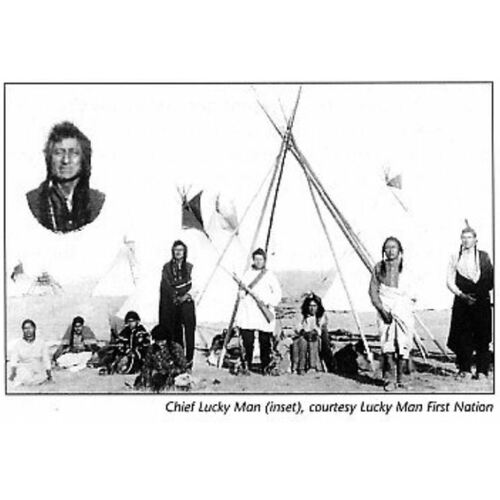
Source: Link
PAPEWES (Papaway, Lucky Man), chief of a band of the River people, a Plains Cree group; b. in the late 1830s, probably near Fort Pitt (Sask.); d. 1901 near Fort Assiniboine, Mont.
Lucky Man was a headman in the band of Big Bear [Mistahimaskwa*] in the 1870s. During the first part of the decade a number of Plains Cree signed treaties with the Canadian government, but Big Bear did not. He tried to negotiate better terms which would provide a territory for the Cree large enough to protect their autonomy. In these efforts he was supported by Lucky Man. The government refused to revise the treaties, and in an attempt to undermine the leaders who had not signed, exploited the fact that from 1879 the buffalo were no longer to be found in Canadian territory: it simply refused to provide food to starving people who had not taken treaty. In an endeavour to weaken further the influence of those leaders who wanted treaty revision, it also promised to recognize as chief any Cree man who could get 100 people to enter treaty. The policy appeared to work, for in 1879 Lucky Man was selected by 409 members of Big Bear’s band to lead them into Treaty No.6.
Lucky Man and his band took treaty to get food. They did not abandon Big Bear’s leadership, and they remained in the Cypress Hills with him. When he went south to hunt in the United States, Lucky Man went along. When the American army escorted the Cree back to Canada in 1881, Lucky Man and his people returned. Later that year Little Pine [Minahikosis*], Payipwat, and other Cree leaders who supported treaty revision attempted to establish a de facto Indian territory in the Cypress Hills by requesting contiguous reserves, and Lucky Man was present at the meeting. Ottawa, seeing what the Cree had in mind, refused to survey reserves in that area. Instead the government again resorted to starving them into submission. In 1882 it cut off assistance to them unless they moved out of the Cypress Hills. After a year of severe hunger, in 1883 Lucky Man and his band agreed to go to the Battleford district and select a reserve site there. It soon became obvious that the band was just a convenient means for some of Big Bear’s people to get assistance. When Big Bear finally took treaty late in 1882, and agreed to move north the next year, Lucky Man’s band shrank drastically. Its membership dropped from 872 in 1882 to only 85 in 1885. Although some people joined the new militant leader Little Poplar, most returned to Big Bear. Even the government no longer had use for Lucky Man; in 1883 he was deposed as chief because of an attempt he made to return to the Cypress Hills.
In the Battleford region Lucky Man continued to work closely with Little Pine, Big Bear, and Poundmaker [Pītikwahanapiwīyin*] to promote treaty revision. He joined with these Cree leaders in 1884 to ask for contiguous reserves, first at Buffalo Lake (northwest of Stettler, Alta), and, when this request was refused, in the Eagle Hills (Sask.). He assisted Big Bear that year in organizing a major Thirst Dance at Poundmaker’s reserve, and participated in a council of Cree leaders at Duck Lake. Both meetings were to discuss treaty revision. His loyalty to Big Bear continued throughout the winter of 1884–85, which he spent at Frog Lake (Alta) in Big Bear’s camp. He was in the camp when Little Poplar, Āyimisīs (Imasees), and Wandering Spirit [Kapapamahchakwew*] took over leadership of the band and, on 2 April, murdered nine white men who happened to be there. Lucky Man and his son remained with the band through its capture of Fort Pitt in mid April and the initial attacks against it by Major-General Thomas Bland Strange*’s forces late in May. Then, in early June, when Big Bear’s followers dispersed, Lucky Man successfully led 26 of his followers to the United States. En route, one of the young men killed George McIvor, a recent immigrant, near Saskatchewan Landing in a bungled attempt to trade a gun for McIvor’s row-boat. The murder resulted in Lucky Man’s exclusion from the amnesty granted in 1886 to most Indian participants in the violence of the previous year.
Lucky Man was one of many Cree from Frog Lake who fled to the United States in fear of prosecution for their actions in 1885. These refugees were destitute, and by the mid 1890s the American authorities wanted to be rid of them. They threatened to use troops to drive the impoverished Cree back to Canada if they did not leave voluntarily. Lucky Man did return to Canada in 1896 but was met at the border, arrested, and thrown into jail for the murder of McIvor. He was not convicted of the crime, and when he was released in 1897, he immediately went back to the United States, where he died in 1901.
GA, M320, V, file 57. Indian and Northern Affairs Canada, Program Reference Centre (Ottawa), Treaty No.6 annuity pay lists, 1879–85. NA, MG 26, A, 210, 247; RG 10, 3152, 3576, 3604, 3668, 3691, 3729–30, 3739, 3745–46, 3755, 3774, 3863. Edward Ahenakew, Voices of the Plains Cree, ed. R. M. Buck (Toronto, 1973). Bob Beal and R. [C.] Macleod, Prairie fire: the North-West rebellion of 1885 (Edmonton, 1984). Can., Parl., Sessional papers, 1883, no.5; 1885, no.3. The Cree rebellion of 1884, or sidelights on Indian conditions subsequent to 1876, ed. Campbell Innes et al. (Battleford, Sask., 1926). H. A. Dempsey, Big Bear: the end of freedom (Vancouver, 1984). Robert Jefferson, Fifty years on the Saskatchewan . . . (Battleford, 1929). W. H. McKay, “Lucky Man’s flight,” Canadian Cattlemen (Calgary), 11 (1948–49): 132–37, 153. Morris, Treaties of Canada with the Indians. Opening up the west: being the official reports to parliament of the activities of the Royal North-West Mounted Police Force from 1874–1881 (Toronto, 1973), reports for 1879–80. Settlers and rebels: being the official reports to parliament of the activities of the Royal North-West Mounted Police Force from 1882–1885 (Toronto, 1973), reports for 1882–83. Norma Sluman, Poundmaker (Toronto, 1967). Stanley, Birth of western Canada. J. L. Tobias, “Canada’s subjugation of the Plains Cree, 1879–1885,” CHR, 64 (1983): 523–26.
Cite This Article
John L. Tobias, “PAPEWES (Papaway) (Lucky Man),” in Dictionary of Canadian Biography, vol. 13, University of Toronto/Université Laval, 2003–, accessed February 8, 2026, https://www.biographi.ca/en/bio/papewes_13E.html.
The citation above shows the format for footnotes and endnotes according to the Chicago manual of style (16th edition). Information to be used in other citation formats:
| Permalink: | https://www.biographi.ca/en/bio/papewes_13E.html |
| Author of Article: | John L. Tobias |
| Title of Article: | PAPEWES (Papaway) (Lucky Man) |
| Publication Name: | Dictionary of Canadian Biography, vol. 13 |
| Publisher: | University of Toronto/Université Laval |
| Year of publication: | 1994 |
| Year of revision: | 1994 |
| Access Date: | February 8, 2026 |




